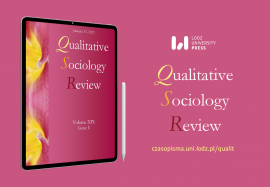Qualitative Sociology Review | Vol. 19 No. 1
Opublikowano: 6 February 2023

For a long time, we have observed an increased interest in qualitative sociology, and the use of an interpretive frame to understand human actions, social processes, meanings and definitions, and new social theory generally. For this purpose, we created “Qualitative Sociology Review” – an open-access international scientific journal enabling a free flow of information and the integration of the community of qualitative sociologists.
“Qualitative Sociology Review” publishes empirical, methodological, and theoretical articles applicable to all fields and specializations within sociology. Every submitted paper is blind-reviewed and quality-controlled by two reviewers. The Editorial Staff and Consulting Editors strive to operate at a high level of scientific quality.
All sociologists who make use of an interpretative paradigm and qualitative research methodology are welcome to submit their articles and support our initiative. We especially welcome researchers who use symbolic interactionism perspective but also grounded theory, sociological ethnography, autoethnography, phenomenology, ethnomethodology, and who use the methods of observation of actions and analysis of lived experiences.
W numerze:
Alecea Standlee
This article considers the extent that new forms of communication technologies developed in the last half century have contributed to new forms of sexual and romantic relationships flourishing among early adults in the United States. This project pays particular attention to the implications of that during the 2020 pandemic lockdowns and the increased dependency on technology that followed. This empirical work uses the theoretical framework provided by the scholarship of George Ritzer (2004), which focuses on the social narratives that drive labor into increasingly rational and functionalist operations, which he terms McDonaldization. This project uses interview data collected from college students to explore attitudes and social forms related to casual sex and the development of serious romantic relationships among participants. In an analysis of the data, three key trends have emerged that can be understood within Ritzer’s theoretical frame. Research participants utilize and value technologies within their intimate relationships as information filters that provide efficiency in creating relationships. They also demonstrate the use of technological, organizational, and connective tools as means to control relationships. Finally, technological tools and symbols signal a kind of semi-standardized symbol of commitment to the relationship, though the meaning of these signs is still contested.
Beata Bielska, Anna Wójtewicz, Katarzyna Mańkowska
The article offers an analysis of living with a fat body and ways of experiencing it in everyday life in the context of stigmatization of this type of corporality. Biographical interviews with fat people of varying socio-demographic profiles were conducted. The analyses show that having a fat body/being fat is generally a stigma that discredits the individual in the eyes of the so-called normals based on both physical characteristics and character traits allegedly associated with fatness. The participants mainly medicalize and internalize the stigma of fatness and manage it specifically by passing, covering, and coming out. In transgender people, fatness may never take on the characteristics of a stigma, but instead allows the individual to obscure another stigma or conform to social expectations of appearance in line with the gender identity.
Contested Discursive Framing of a Bank’s Cooptative Joint CSR Model
Riki Galia
There is a dearth of critical ethnographic research that focuses on the semiotic-discursive features of corporate social responsibility (CSR) framing in business and nonprofit (BUS-NPO) partnerships. This article contributes to CSR scholarship by combining ethnographic methods (participant observation, in-depth interviews, and textual materials) and semiotic analysis to demonstrate how a bank-NPO partnership is discursively framed in the context of agonistic interactions and its implications in terms of cooptation.
This article crystallizes two arguments. First, the bank’s joint CSR initiatives represent a discursively framed and validated model of CSR as a commodity aiming at advancing bank interests at the cost of avoiding substantive and sustained social responsibility. Second, the joint CSR model, discursively framed as a cooptative partnership discourse, is effectively realized through the practices of the cooptative relationship between the bank and the NPOs.
Szymon Pilch
The paper reconstructs the ways of attributing meanings to IT specialists’ careers at BPO (Business Process Outsourcing) centers in Poland. The findings rely on empirical data, collected through autobiographical narrative interviews. The technique of analysis applied in the study was inspired by grounded theory methodology and allowed for the identification of a basic social process at the analytical stage, namely, “career planning.” On the one hand, the analysis also showed how IT specialists’ careers are given meanings concerning career planning; there seem to be three main ways of understanding one’s career in IT: (1) in terms of reaching economic and social stability, (2) as a transition period in a career as an IT specialist, (3) with regard to becoming an expert in IT. On the other hand, the second axis of analysis has been conceptualized, which is comprised of other subjective and objective elements that may shape career planning. These include the biographical experiences of work, the context of the Polish BPO industry, and career planning resources. Furthermore, a typology consisting of three ways of attributing meanings to IT specialists’ careers at BPO centers has been put forward and analyzed.
Skill and Deskilling in Two Automotive Assembly Plants in South Africa
Siphelo Ngcwangu
This article presents research on skills development and workplace change complexities within two automotive assembly plants in Pretoria, South Africa. Auto assembly companies are also termed Original Equipment Manufacturers (OEMs). Since 1995, South African OEMs have become fully integrated into the global networks of their foreign parent companies. As South Africa’s leading manufacturing sector, the automotive industry’s increasing importance is reflected in its exports, investments, and contribution to the country’s gross domestic product. The two companies are global multinationals situated in one of South Africa’s most globally integrated sectors that have undergone significant mechanization and automation since the 1990s. Therefore, these companies present a relevant site for studying changes in the labor process and the tendencies of deskilling in these workplace environments.
The research is based on a qualitative research design that used semi-structured interviews with workers, supervisors, and managers across two plants that assemble motor vehicles in South Africa. The objective of the research was to understand the nature of changes to workplace production methods that influence the character of skills amongst the workforce. This paper studies workers’ experiences on how changes in work processes have impacted their work skills and contributed to the processes of deskilling. Present studies of skills in South Africa have prioritized large-scale labor market aggregate data analysis or reforms in education and training policies of the state. This paper brings a perspective on the labor process changes that are informed by concrete analysis of the production process and how technological changes shape the character of skills formation within automotive assembly plants. The value of such an approach is that it brings to the discussion of technology and workplace change a more specific set of experiences that transcends the often speculative and mythical discussion about the impact of technology on work. This article highlights the importance of understanding workers’ voices, shift supervisors, and managers on the contested nature of skills development within capitalist enterprises. The findings illustrate the contradictory nature of technological change and skills development. This is shown by discussing the following themes that emerged from the findings: 1) worker responses to the introduction of robots in the workplace environment, 2) the deskilling challenge on the two plants, and 3) grappling with the turnover times of capitalist production. I conclude the paper by revisiting the key findings of the research and showing the implications for future studies of deskilling in contemporary capitalist enterprises. The significance of these findings ultimately points to the importance of locating labor processes and deskilling in the context of the political economy of the capitalist mode of production and how it is reshaping the content of work in modern automotive assembly plants.
Komentarze
Ten post dostępny jest także w języku: Polish





